Do you take care of a garden or house plants? If so, you know how important it is to give them enough water. Are leaves starting to droop or look a little wilted? Then, it’s time for the watering can.
It’s often obvious when plants need water, but it can be much trickier for humans. In fact, some studies suggest that many, if not most, people may be chronically dehydrated.
Research from the 1990s estimated that around one-quarter of older adults in the United States may not be regularly getting enough fluids, to the point where they experience clinical symptoms. However, a survey conducted in 2023 suggested that almost half of all US residents may not drink enough water for optimal health.
That sounds a bit weird, doesn’t it? I mean, most people can tell when they’re hungry, tired, or need to breathe. What is it about dehydration that’s so hard to recognize?
Part of the answer may be that dehydration can make you less sensitive to water intake. When dehydrated, your body tries to compensate by doing more with less water, even if you’re drinking enough. This can make it difficult to notice that you’re dehydrated. It doesn’t help that as we age, our body’s ability to retain fluids decreases, and the natural sensation of thirst tends to weaken.
So, to have and maintain good health, it’s really important to understand the importance of hydration and recognize the early warning signs of dehydration.
In this article, we’ll explore the benefits of adequate hydration, the risks associated with dehydration, and practical strategies for staying properly hydrated. We’ll also discuss the significance of clean water and the role of hydrating foods and beverages in maintaining optimal hydration.
What Is Hydration?
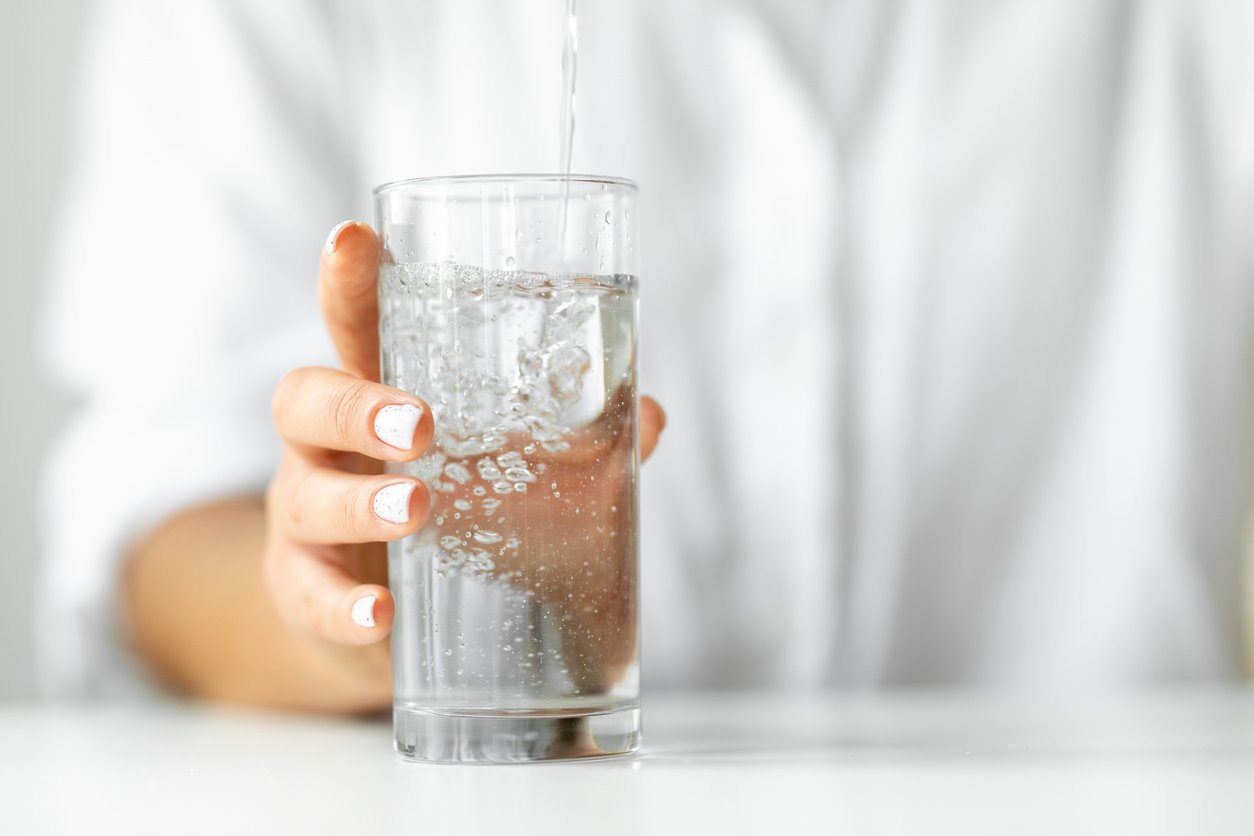
Hydration (from the Greek word “hydra,” meaning water) refers to providing the body with adequate fluids to maintain optimal physiological functions. Your body loses water daily through breathing, sweating, and excretion, making it essential to replenish fluids regularly.
Your body is mostly water — around 50–75%, depending on your age and amount of muscle and fat — which is about 10–12 gallons.
Why Is Hydration So Important for Your Health?
Water is essential for various bodily processes, including temperature regulation, blood flow, digestion, nutrient absorption, and waste elimination. Every cell, tissue, and organ in your body needs sufficient water to function properly. So, let’s look at some of the most important functions affected by your hydration status.
Hydration and Cognitive Function

In 2019, researchers in Cangzhou, China, had 12 healthy young men go without water for 36 hours and then take tests to evaluate their cognitive abilities and mood. After that, they were given a liter and a half of water to drink and were retested an hour later.
When dehydrated, the participants experienced low energy levels and decreased self-esteem. They also did poorly on tests of memory and attention compared to when they had been given water.
A study the following year found similar results. Sixty-four college students were randomized to four groups. They all fasted overnight and took cognitive and mood assessments in the morning. Then, each group was given a different amount of water, ranging from half a liter to none, and was retested.
Those who drank the most water had less anger, fatigue, and overall mood disturbance than those who consumed the least (or none). The group that drank half a liter also showed significant improvement in working memory compared to their performance before drinking.
The participants in these studies experienced temporary cognitive decline when dehydrated, but there’s evidence that chronic dehydration can cause long-term neurological harm.
In 2018, researchers analyzed the hydration levels of 1,091 patients (by testing their urine) in an Alzheimer’s Evaluation Unit. They found that patients with cognitive decline or depression had higher levels of dehydration than those without these issues. Dehydration was linked to a greater risk of developing dementia, particularly Alzheimer’s disease and vascular dementia.
Dehydration and Skin
Hydration is also good for your appearance and the health of your skin. A 2015 study instructed young women to drink two additional liters of water per day for a month and measured aspects of skin health before and after. The researchers found that drinking more water improved the skin, including deep and shallow hydration and elasticity (important for preventing wrinkles).
Researchers are also exploring whether increased hydration could help children suffering from atopic dermatitis, a condition that causes their skin to be very itchy, red, and dry.
Hydration and Kidney Health

Analysis of Korean health and nutrition survey data revealed that increasing daily water intake can protect against kidney problems, especially in older adults, men, and those consuming high-sodium diets. The study found that even moderate water consumption significantly reduced the risk of renal (kidney) impairment.
A 2016 literature review published in the always popular American Journal of Nephrology found that drinking more water helps protect from chronic kidney disease, kidney stones, and polycystic kidney disease.
Gastrointestinal Function and Water Intake
The bacteria in our digestive system play important roles in our health. While factors like diet and lifestyle are known to affect these bacteria, what about the source and amount of drinking water people consume?
In 2022, researchers analyzed data from the American Gut Project to assess the effects of different amounts of different water sources (tap, bottled, filtered, and well) on people’s gut microbiomes. They found drinking less water was associated with higher concentrations of Campylobacter, a potentially harmful bacteria, and that well water was associated with the most diverse gut microbiomes.
A 2024 study found that not drinking enough water can harm gut health in mice. (Our view on the use of animals in medical research is here.) When the mice had less water, they became constipated, their gut bacteria changed, and they lost infection-fighting immune cells. As a result, the mice had a hard time getting rid of a harmful bacteria called Citrobacter rodentium.
Hydration and Weight Loss
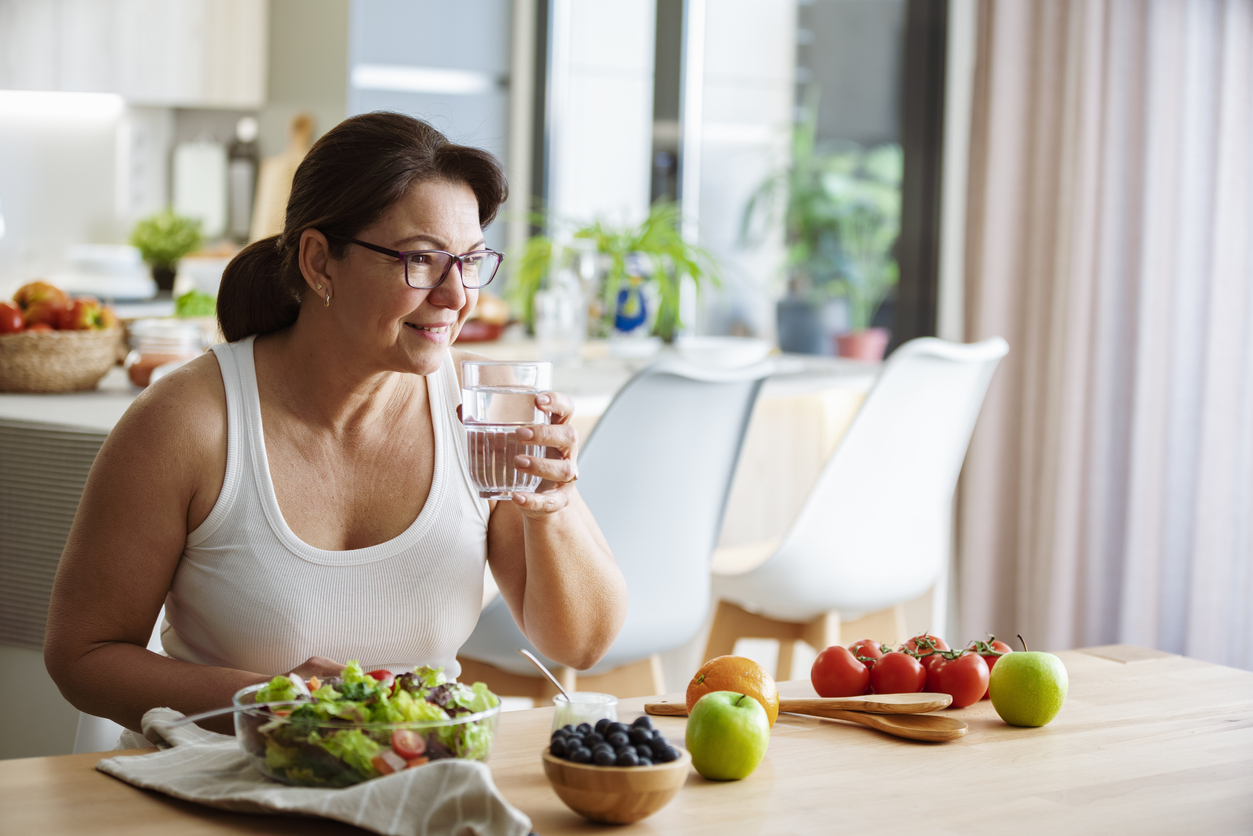
Drinking enough water can also help with weight management. A 2016 study found that adults who don’t drink enough water tend to have higher body weights and are more likely to be obese.
A 2019 study of healthy young adults in Spain found that people who drank more water had less body weight, lower body fat, and smaller waistlines.
Hydration and the Heart
Drinking enough water each day can help keep your heart healthy and reduce the risk of heart problems as you age. In 2022, researchers analyzed data from 15,000 adults aged 44–69 and discovered that those who stayed hydrated had a lower chance of developing heart failure and other heart issues.
A 2019 literature review found that dehydration negatively impacts cardiovascular function, particularly during exercise or in high temperatures.
And a 2023 meta-analysis found that drinking water or isotonic drinks (electrolyte beverages like Gatorade) before, during, and after exercise helps keep heart rates lower and improves heart rate variability (a sign of good heart adaptability).
Overall, the results showed that staying hydrated during exercise aids in heart performance and recovery.
Dangers of Dehydration

We’ve seen that not getting enough fluids can mess with your mood and your thinking. And long-term dehydration is linked to chronic neurological and cardiovascular diseases. When acute, though, dehydration can be dangerous.
When you lose more fluids than you’re taking in, your body can’t function properly after a certain point. Losing water means elevated levels of electrolytes in your blood, which can cause an imbalance of sodium, potassium, magnesium, and other molecules. Symptoms of such an imbalance can include confusion and irritability, fatigue, and irregular or fast heart rate.
Dehydration can happen simply because you’re not drinking enough water or other hydrating fluids. But there are other factors as well. You can become dehydrated due to illnesses, especially those that involve vomiting, diarrhea, or high fever accompanied by sweating. Sweating from heat or intense physical activity can also lead to dehydration, as can excessive peeing caused by medications, medical conditions, and caffeinated or alcoholic beverages.
Signs and symptoms of dehydration include thirst, dry mouth, lips, and skin, urinating and sweating less than usual, dark-colored urine, fatigue, dizziness, or headache.
These symptoms can emerge with water loss as low as 1% of body weight and can become life-threatening at 10% or more. Extreme dehydration is a medical emergency that can result in seizures, cardiac arrhythmia, hypovolemic shock, and even death.
How Much Water Do You Need?
Experts debate how much water we should drink. One catch-all recommendation for how much water you need is 9 cups of fluids a day for women and 13 for men. Another rule of thumb is to consume between one-half and one ounce of water per pound of body weight daily. That’s a big range — for a 160-pound person, that would mean between 80 and 160 ounces or 8 to 16 cups per day.
However, these numbers may be on the high side, especially for plant-based eaters who consume lots of hydrating foods such as fruits and vegetables. While we know the water content of foods, there’s very little reporting on how much those foods contribute to our total water intake. A 2016 paper examining survey data from the UK and France estimated that the average person gets about 20–40% of their fluid intake from foods.
Of course, few people are average. Many factors determine how much water you need to drink. Certain medications, high fiber intake (from a plant-based diet), and age can increase your water requirements. If you are exposed to extreme temperatures, your body demands more fluids to maintain a safe internal body temperature.
You also need to drink more if you engage in intense physical activity. If you’re planning significant exertion, such as a run or some activity that will make you sweat for a while, you may want to “pre-hydrate” by drinking a cup or two a couple of hours before your activity, followed by another cup or two about 30 minutes before the start.
And since sweat contains more than just water, it’s essential to eat food after intense sweat-inducing physical activity to replenish the electrolytes your body has lost.
Like with just about anything, you can go overboard. (That’s a metaphor, but literally going overboard involves excessive quantities of water, so I’ll stand by it.)
Drinking too much water can dilute the electrolytes in your blood. The electrolyte most affected by overhydration is sodium. And low sodium levels constitute a condition called hyponatremia, which can produce many of the symptoms of dehydration, as well as seizures and coma.
One much less serious symptom of consuming too much water is having to pee a lot. This is mainly an issue if the need to urinate wakes you up and disturbs your sleep — which is why many people prefer to do most of their hydrating in the earlier portion of the day and go to bed with a relatively empty bladder.
The Importance of Clean Water
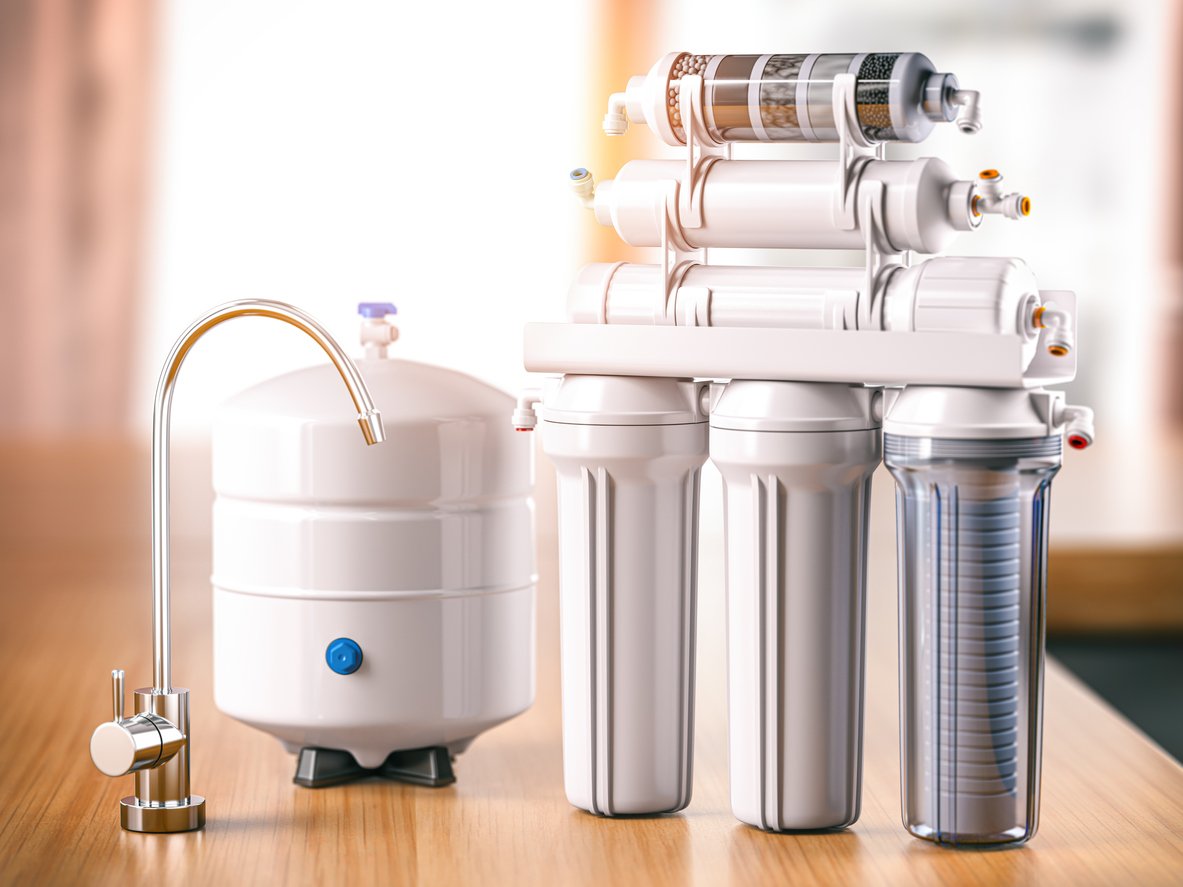
Clean water is essential for health and hydration since contaminated water can carry dangerous pathogens and pollutants that can lead to various health issues. The pathogens in dirty water are responsible for many serious diseases, including cholera, dysentery, and giardiasis.
Non-living contaminants can also be harmful or even deadly. Endocrine disruptors, heavy metals, and other chemicals can lead to long-term health issues, including cancer and organ damage.
You may not have much control over the quality of the water that comes through your tap, but you can clean it through a home water treatment system. Popular water treatment methods include carbon filters and reverse osmosis filtration to remove contaminants and ultraviolet light to kill pathogens.
Home filtration systems have several advantages over bottled water. First, they eliminate the waste stream of single-use plastic. Second, the plastic in those bottles can leach into the water they contain, which kind of defeats the purpose. And third, bottled water companies frequently engage in questionable water sourcing — sometimes, you’re just drinking lightly filtered water from someone else’s tap.
Hydrating Foods and Beverages
Although experts recommend that water be your primary source of hydration whenever possible, people might not hydrate sufficiently because they aren’t thrilled by the taste of water.
In addition to filtering water, you can add things to flavor it to your liking. These might include citrus slices (oranges, lemons, and limes are popular), mint leaves, or cucumber slices. You can also freeze fruit in ice cubes and add them to water for a prettier drink.
Aside from regular still water, other types of water are also hydrating, including carbonated water and mineral water. (If you love carbonated water, you can get your own home carbonation system, which can save money, reduce your exposure to plastic, and lower your environmental footprint.)
Any water-based beverage is also hydrating. These include plant-based milk (which can taste great and provide a creamy texture without the problems of animal-based dairy, such as saturated fat, environmental impact, and animal cruelty), smoothies, mocktails, coffee and tea, and fruit juices.
While coffee and black teas are technically diuretics (since their caffeine makes you pee more), they still add more water to your body than they remove. On the other hand, fruit juices may be high in sugar, especially if they’ve been heavily processed.
Fruits and vegetables are the most hydrating foods. Particularly hydrating fruits are the ones that are the most likely to drip onto your clothes when you eat: melons, peaches, pears, citrus fruits, berries, and so on. High-water vegetables include leafy greens, celery, squash, and root veggies such as carrots, potatoes, radishes, and sweet potatoes.
Many hydrating beverages deliver antioxidants, vitamins, minerals, and even protein along with water. Those can be good things. Others deliver sugar, phosphoric acid, artificial flavorings, and artificial sweeteners, which likely aren’t doing your health any favors. So, are you best off drinking pure water or other hydrating beverages? It depends on what’s in them. But for almost everyone, pure water is best for dental health.
Hydrating Recipes
Quench your thirst and elevate your meals with these hydrating, nutrient-packed, plant-based recipes! Perfect for keeping you refreshed and energized all day long, these dishes are ideal for whenever you need a hydration boost.
1. Cooling Watermelon Gazpacho
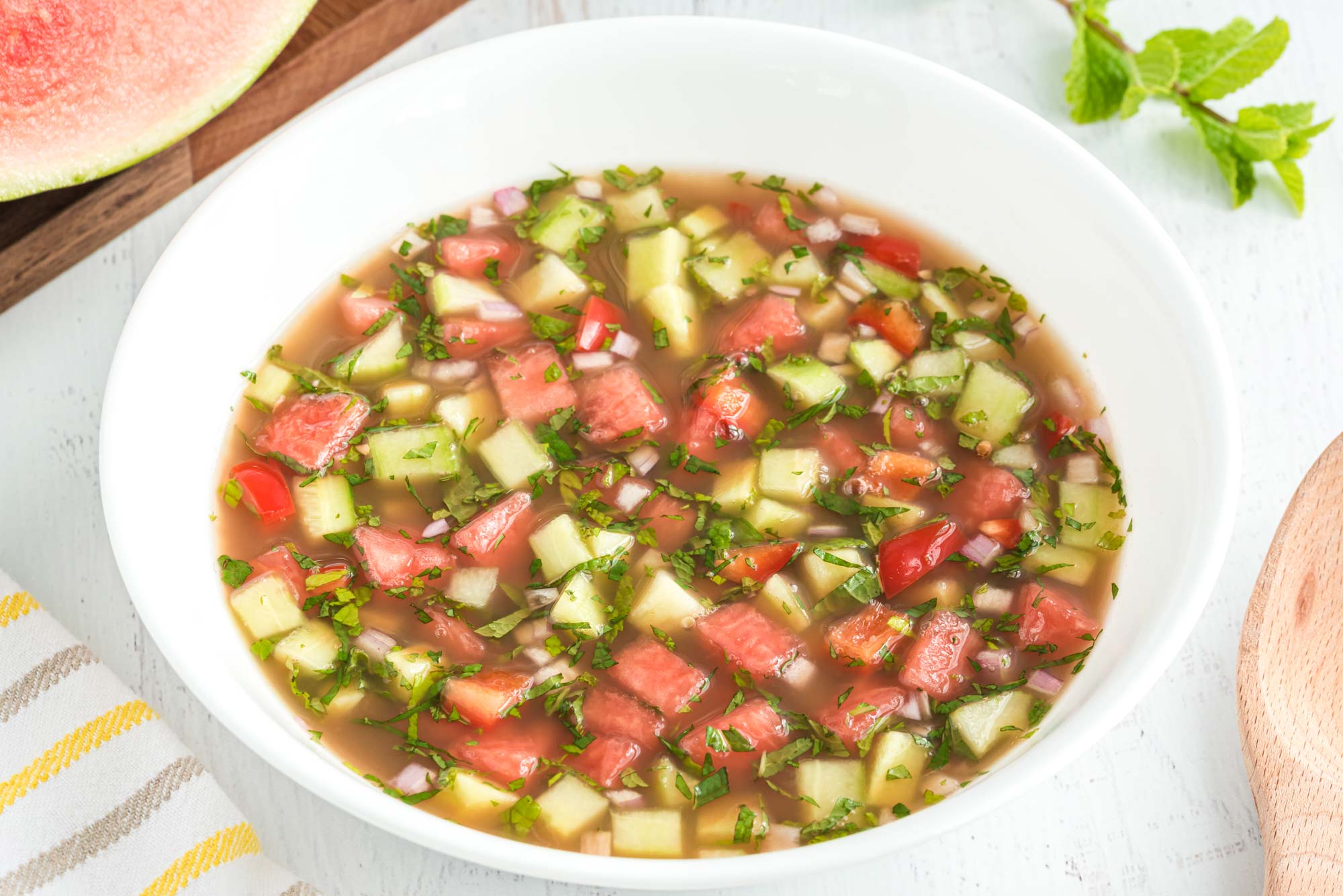
Cool down with this hydrating and revitalizing Watermelon Gazpacho. Not only is it super refreshing and bursting with flavor, but it’s packed with potassium and natural sodium (to replenish those electrolytes!), as well as antioxidants like vitamin C and carotenoids. Tip: the flavors in this soup are even better the next day. Make it the day before for an even tastier Watermelon Gazpacho experience.
2. Spinach Orange and Pomegranate Salad

Enjoy the refreshing and hydrating Spinach Orange and Pomegranate Salad. Organic spinach forms a nutrient-rich base, while juicy orange segments and pomegranate arils add a burst of hydration and vitamin C. Pickled red onions, lime or lemon juice, and slivered almonds provide a perfect balance of flavors and textures. Topped with a zesty Orange Shallot Vinaigrette, this salad is a delicious way to stay nourished.
3. Farmer’s Market Smoothie
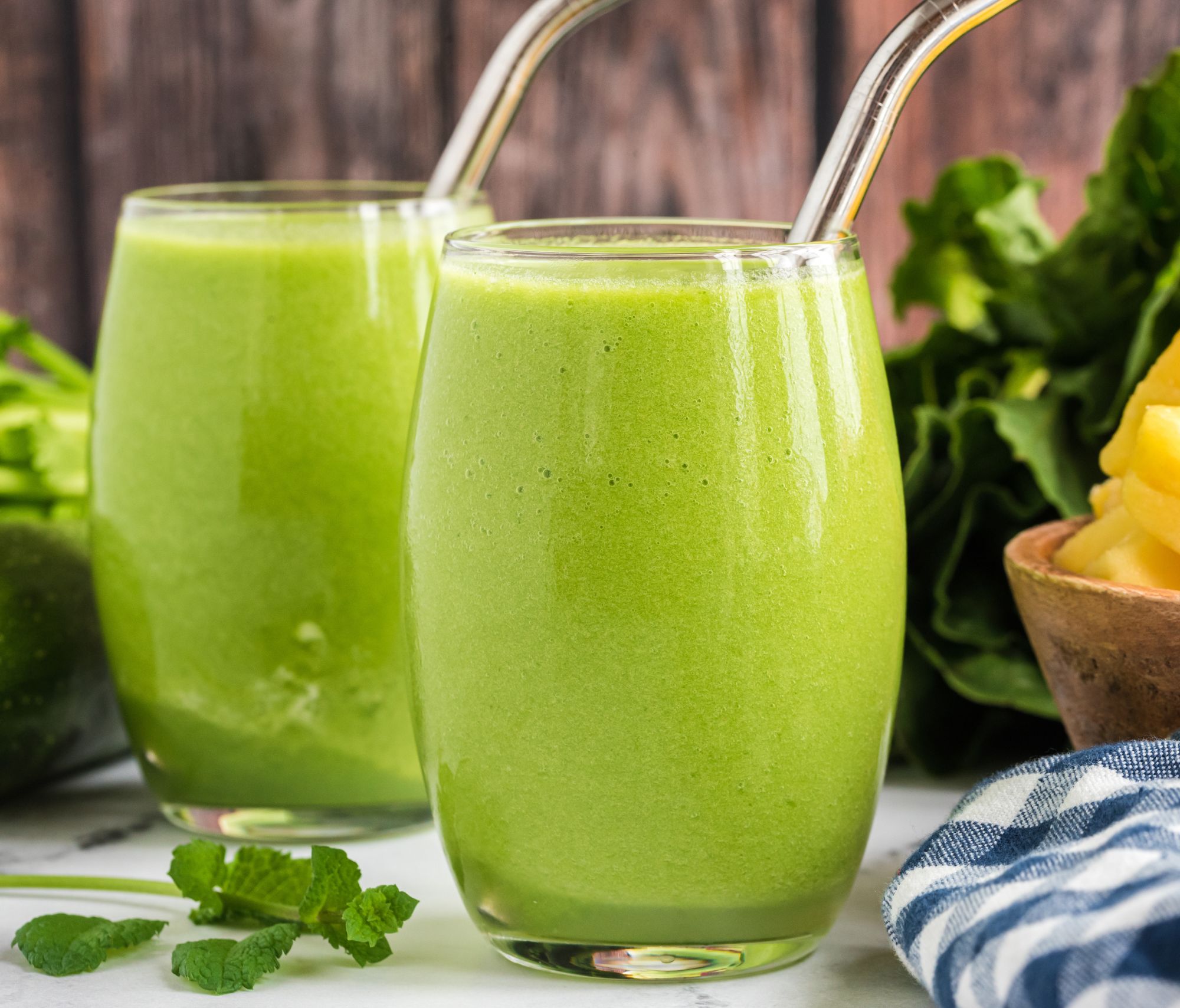
The Farmers Market Smoothie is a beautifully green and ultra-hydrating beverage. It’s packed with high-water-content fruits and vegetables like celery, romaine lettuce, pineapple, and summer squash. This combination creates a nutrient-rich, effortlessly refreshing smoothie that you can enjoy any time of day. Stick to this delicious fruit and veggie combo, or get inspired to create your own version based on other hydrating finds from your garden or local farmers market!
Stay Hydrated for Health!
Hydration is a key component of a healthy lifestyle, providing the foundation for your body to perform at its best. Adequate fluid intake supports essential bodily functions, from regulating temperature and aiding digestion to enhancing cognitive performance and maintaining skin health. Understanding the signs of dehydration and the amount of water your body needs can help prevent the adverse effects.
Incorporating hydrating foods and beverages into your diet and regular clean water consumption can significantly improve your health. To ensure you’re staying hydrated with enough water, here are some tips:
- Carry a water bottle with you (stainless steel or glass are probably best — not plastic)
- Incorporate more hydrating foods into your diet
- Set a timer to remind you to drink throughout the day
Now, water are you waiting for? Stay hydrated!
Tell us in the comments:
- Do you have a method for reminding yourself to drink water?
- What high-water-content foods do you eat regularly?
Featured Image: iStock.com/Goodboy Picture Company



